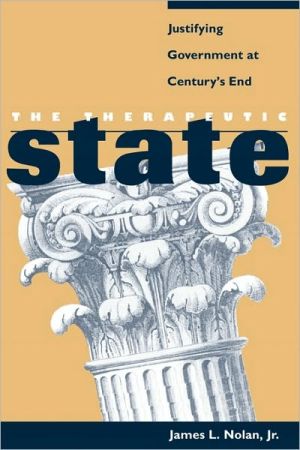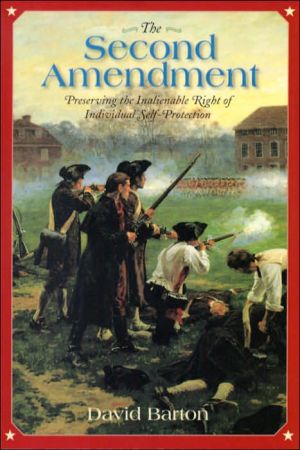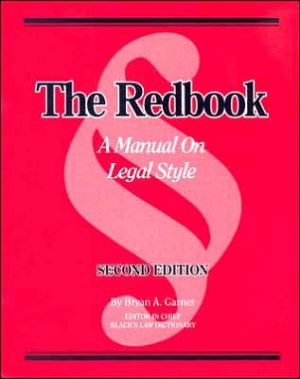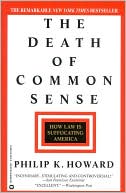The Therapeutic State: Justifying Government at Century's End
The United States has always been profoundly conflicted about the role and utility of its government. Simmering just beneath the surface of heated public discussions over the appropriate scope and size of government are foundational questions about the very purpose of the state, and the basis of its authority. America's changing and diversifying cultural climate makes common agreement about the government's raison d'être all the more difficult.\ In The Therapeutic State, James Nolan shows us...
Search in google:
The United States has always been profoundly conflicted about the role and utility of its government. Simmering just beneath the surface of heated public discussions over the appropriate scope and size of government are foundational questions about the very purpose of the state, and the basis of its authority. America's changing and diversifying cultural climate makes common agreement about the government's raison d'être all the more difficult. In The Therapeutic State, James Nolan shows us how these unresolved dilemmas have coalesced at century's end. Today the American state, faced with a steady decline in public confidence, has embraced a therapeutic code of moral understanding to legitimize its very existence. By ranging widely across education, criminal justice, welfare, political rhetoric, and civil law, Nolan convincingly illustrates how the state increasingly turns to the therapeutic ethos as a justification for its programs and policies, a development that will profoundly influence the relationship between government and citizenry. In a tone refreshingly free of polemic, Nolan charts the dialectic relationship between culture and politics and, against the backdrop of striking historical contrasts, gives example after example of the emergence of therapeutic sensibilities in the processes of the American state. Booknews An analysis of the commingling of the therapeutic and political cultures in America. Nolan (anthropology and sociology, Williams College) supplies his background by looking at trends such as the emotivist ethic, the pathologization of human behavior, the rise of a new priestly class, and the legitimization of the state. He then looks specifically at emotionally and psychologically based personal injury cases, public education from the colonial period through the progressive era to what he calls "therapeutic education," welfare policy, and presidential election debates from Lincoln-Douglas through Clinton-Bush-Perot. Nolan concludes with an examination of the "therapeutic state" itself, discussing therapeutic utilitarianism, postmodernism, and coercion. Annotation c. by Book News, Inc., Portland, Or.
List of TablesAcknowledgments1The Therapeutic Culture1The Emancipated Self2The Emotivist Ethic5A New Priestly Class7The Pathologization of Human Behavior9Victimization15The Therapeutic Ethos172Legitimation of the State22Theoretical Considerations23Older Sources of Legitimation27State Expansion38Public Disenchantment40The Therapeutic Alternative453Civil Case Law46Personal Injury Law46The Doctrinal History of Emotional Damage Cases55Recovery of Emotional Damages in the New Legal Climate62Psychologists as Expert Witnesses68Litigation Reform: Therapeutic and Utilitarian Defenses724Criminal Justice77Drugs and Crime78The Historical Antecedents to Therapeutic Justice80Courtroom Therapy83Prison Therapy1125Public Education128The Colonial Period129Universal Free Education132Compulsory Education138The Progressive Era140The Cosmopolitan Era146Therapeutic Education150School Counselors151In a State of Esteem1726Welfare Policy182Congress and the Well-Being of Children183Child Labor Laws and the Children's Bureau (1906-1912)184The Sheppard-Towner Act (1921)191Social Security and Emergency Wartime Aid to Children (1939-1945)199Head Start and Operation Good Start (1965-1970)207Head Start and Child Abuse Bills (1985-1990)213Welfare Reform: Rejection or Extension of Therapeutic Welfare?220Excursus: The Clarence Thomas and Anita Hill Hearings2267Political Rhetoric235The Therapeutic President235Political Oratory241The Lincoln-Douglas Debates244The Kennedy-Nixon Debates252The Reagan-Mondale Debates259The Clinton-Bush-Perot Debates266The Talk Show Debate269The Therapeutic Candidate273The Triumph of Therapeutic Discourse275Summary2798The Therapeutic State280Therapeutic Utilitarianism283A Postmodern State?286An Assessment of the Continuing Dialogue291Therapeutic Coercion292Legitimation Reconsidered297The Problem of Consent300The Paradox of Unintended Consequences304Appendixes309Notes329Selected References383Index391
\ From the Publisher"...Nolan argues that America's therapeutic culture has recently moved from the cultural realm of "symbols and codes" to penetrate the institutions of the modern American state. By delineating sharply between the culture of the therapeutic and therapeutic poicymaking, Nolan's probing work provides an important new methodological frame with which to study the therapeutic."\ -American Studies International,\ \ \ \ \ \ BooknewsAn analysis of the commingling of the therapeutic and political cultures in America. Nolan (anthropology and sociology, Williams College) supplies his background by looking at trends such as the emotivist ethic, the pathologization of human behavior, the rise of a new priestly class, and the legitimization of the state. He then looks specifically at emotionally and psychologically based personal injury cases, public education from the colonial period through the progressive era to what he calls "therapeutic education," welfare policy, and presidential election debates from Lincoln-Douglas through Clinton-Bush-Perot. Nolan concludes with an examination of the "therapeutic state" itself, discussing therapeutic utilitarianism, postmodernism, and coercion. Annotation c. by Book News, Inc., Portland, Or.\ \








